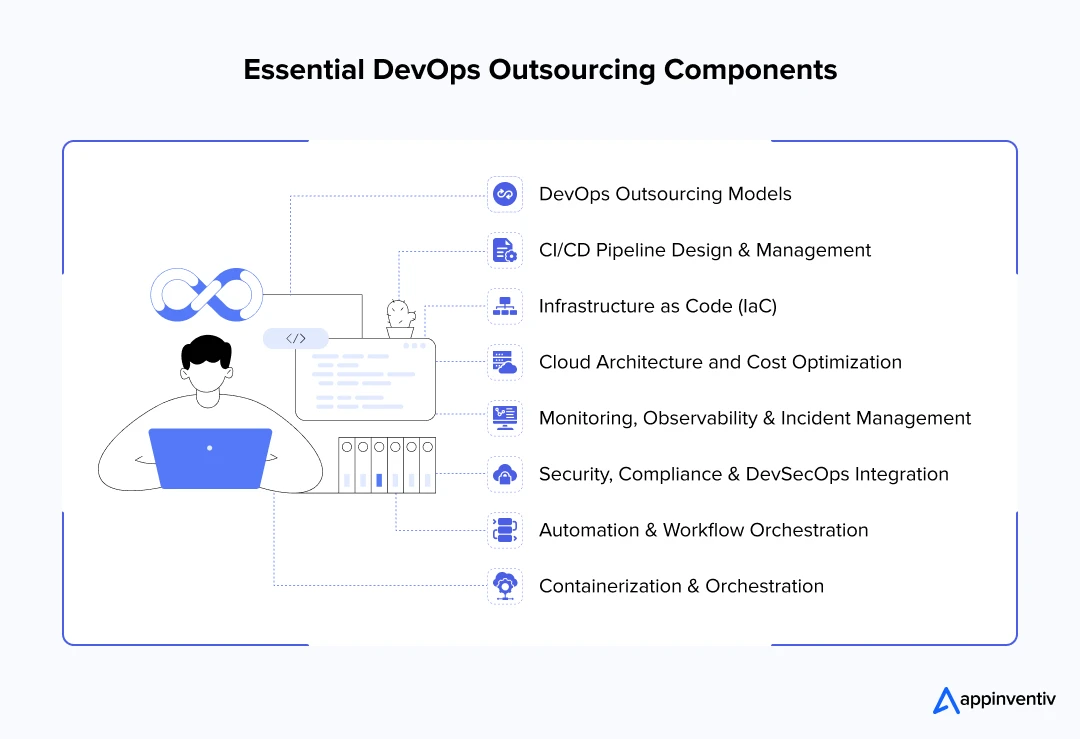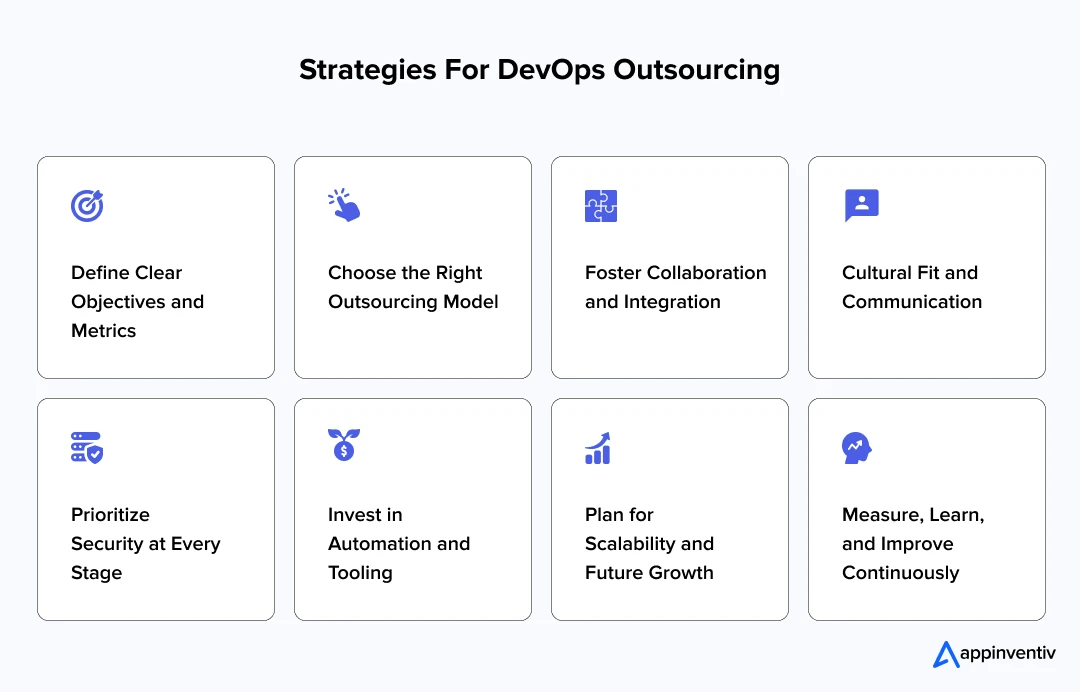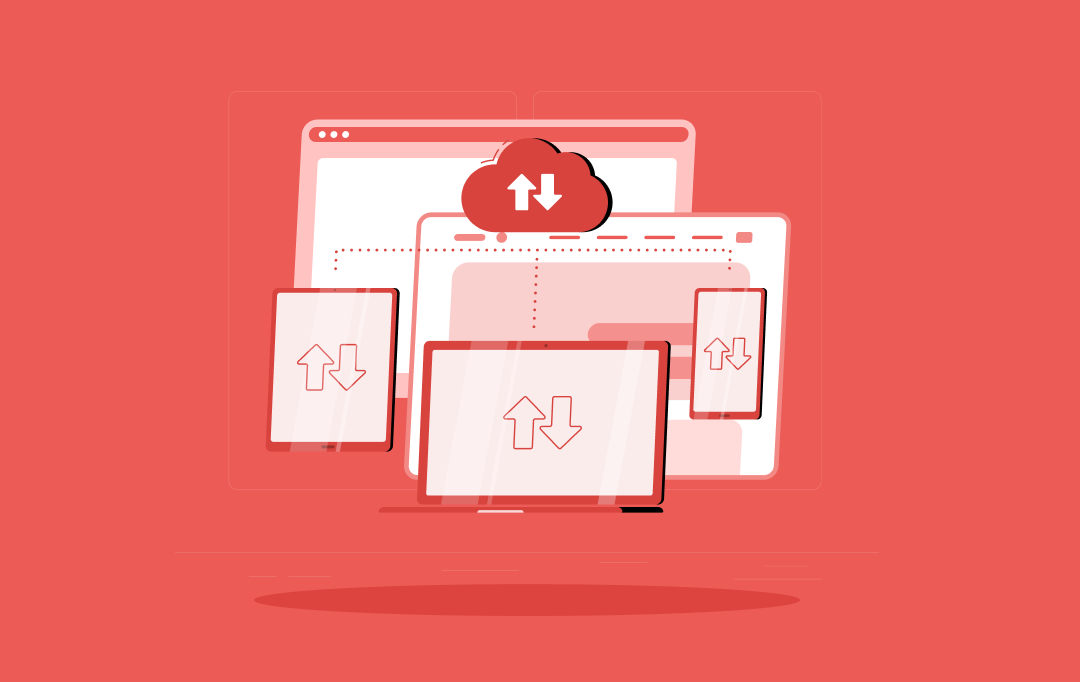Enterprise IT teams today are under siege. Market demands are shifting faster than ever, customer expectations are sky-high, and the pressure to deliver secure, high-quality software at speed has never been more intense.
But here’s the kicker – most in-house teams are stuck firefighting legacy infrastructure issues, managing complex toolchains, and navigating organizational silos that kill velocity. That’s where DevOps outsourcing steps in, not as a cost-cutting shortcut, but as a strategic lever for growth, agility, and resilience.
Smart enterprises aren’t asking if they should invest in outsourced DevOps services. They’re asking how soon they can start and how to do it right. From global banks to Fortune 500 retailers, forward-looking organizations are discovering that outsourcing DevOps doesn’t just speed up the development – it transforms the very DNA of how they build, ship, and scale digital products.

DevOps outsourcing delivers more than just accelerated delivery pipelines; it provides access to specialized expertise and cutting-edge tools that in-house teams often struggle to maintain. Enterprises can tap into a global talent pool of engineers skilled in automation, cloud-native architectures, and continuous integration/continuous deployment (CI/CD) workflows.
For industries such as finance or e-commerce, where downtime can cost millions of dollars per hour, this reliability is a game-changer. Additionally, outsourcing partners often incorporate compliance and security best practices into their workflows, enabling organizations to navigate stringent regulations such as GDPR or PCI-DSS without compromising development timelines.
In this article, we’ll unpack why DevOps outsourced services have become a game-changer, the essential components of DevOps outsourcing, and how you can leverage them to stay ahead, without losing control.
Why Are Enterprises Betting Big on DevOps Outsourcing?
DevOps for businesses, especially those that are outsourced, has quietly become one of the smartest strategic moves for enterprises navigating the pressures of modern software delivery. It’s not just about cost arbitrage anymore. It’s about gaining a competitive edge in speed, resilience, and innovation – something internal teams, burdened by constraints, rarely achieve on their own. Let’s look at the benefits of DevOps outsourcing that make the move a game-changer.
Scaling Delivery Without Scaling Chaos
When a US-based retail giant saw demand spike across its omnichannel platforms, its in-house engineering team struggled to keep up. Weekly deployments failed QA. Hotfixes caused downtime. Infrastructure changes were manual and undocumented. After outsourcing DevOps to a specialized partner, they rebuilt their delivery pipeline, implemented automated testing and blue-green deployments, and reduced release time by 70%. Today, they deploy multiple times a day with confidence.
The advantages of DevOps outsourcing lie in the fact that the outsourced teams bring maturity and speed to CI/CD. They arrive with ready-to-use toolchains, repeatable frameworks, and the operational muscle to eliminate delivery friction.
Bonus Read: How does CI/CD save up to 20% of development time?
For example, Netflix experienced a major database corruption that prevented DVD shipments for three days. This crisis drove them to migrate to AWS and completely redesign their application architecture. Netflix adopted a microservices-driven virtual machine (VM) architecture that was resilient, CI/CD-enabled, and elastically scalable. They implemented a “you build it, you own it” philosophy, making development teams responsible for the operation of their services. (Source – Reuters)
Outcomes:
- Subscriber Growth: Netflix gained eight times as many subscribers as it had before the loss.
- Streaming Growth: Monthly streaming hours grew a thousand times.
- Operational Efficiency: Managed massive scale with 0 Network Ops Centers and 70 operations engineers.
Tapping Global Expertise, Not Just Local Availability
Even well-funded enterprises face talent shortages when it comes to niche DevOps skills. Whether it’s Kubernetes security hardening, GitOps implementation, or cloud cost optimization, these aren’t generalist roles – they’re deep specializations.
Outsourced DevOps services open up global access to that kind of talent. For instance, a California-based healthcare SaaS platform requiring HIPAA-compliant DevSecOps found that US-based engineers were too costly and difficult to retain. By outsourcing to a hybrid onshore-offshore model, they gained access to a multi-disciplinary team with cloud, compliance, and automation experience, at one-third the cost of building it in-house.
Bonus Read: Why DevSecOps is crucial for tackling cloud security challenges
Operational Maturity from Day One
DevOps isn’t just about tools – it’s about culture, processes, and measurement. Many internal teams get stuck building from scratch, cobbling together solutions, and reinventing the wheel.
Contrast this with what you get from a seasoned DevOps services and solutions firm: pre-built blueprints for observability, IaC templates, security postures, zero-downtime deployment models, and real-time dashboards. A European fintech entering the US market outsourced its entire infrastructure layer and got a fully containerized, auto-scaled, SOC2-ready environment delivered in just six weeks. That’s years of operational learning – delivered on day one.
For example, Capital One developed a virtual development “clean room” concept with well-defined guidelines ensuring code quality before release. This included processes for identifying and registering all product pipelines, testing and scanning every code change, and controlling access to production servers. Jenkins enabled automated software delivery, increased operational stability, and improved developer experience from implementation. (Source: DevOps Talks Conferences)
Operational Maturity Metrics:
- Quality Gates: Automated testing and scanning for every code change
- Security Controls: Defined access controls to production environments
- Process Standardization: Consistent pipeline management across teams
Always-On Reliability and Coverage
Let’s face it – incidents don’t follow 9-to-5. Enterprises serving global customers can’t afford midnight outages or delayed responses to critical alerts.
The advantages of DevOps outsourcing include 24/7 coverage models with follow-the-sun support. A global logistics platform with customers across time zones outsourced its SRE function. It achieved a 99.99% uptime SLA, thanks to proactive monitoring, instant alerting, and automated rollback strategies implemented by its DevOps vendor.
Internal teams sleep. Outsourced teams don’t.
For example, Netflix pioneered the concept of Chaos Engineering to ensure always-on reliability. They developed Chaos Monkey, a tool that randomly terminates instances in production to test system resilience. This approach compelled developers to design and build fault-tolerant systems from the ground up. (Source: Netflix)
Also Read: SRE vs DevOps vs Platform Engineering
Lower Total Cost, Higher Strategic Focus
It’s not just about reducing headcount costs – it’s about ROI. What’s the cost of one failed release? One week of downtime? One missed market opportunity?
One of the benefits of DevOps outsourcing lies in how it shifts maintenance and firefighting to specialized teams, allowing your team to focus on high-leverage work, such as core product development, customer experience, and innovation. One enterprise tech firm redirected its internal engineers from maintaining Jenkins and Terraform scripts to building ML features and APIs. The result: faster product innovation and increased developer morale.
De-Risking Transformation and Cloud Modernization
DevOps is the backbone of cloud transformation, but it’s also one of its biggest failure points. Without the right guidance, enterprises overspend, underperform, or stall altogether.
A legacy insurance company undergoing an AWS migration found itself mired in networking issues and broken Infrastructure as Code (IaC) deployments. Outsourcing the migration to a DevOps specialist helped them decouple apps, automate infrastructure, and complete what was a 12-month roadmap in five.
Even Boeing approached Onshore Outsourcing to bring over 5,000 internal applications into compliance with modern security standards. The outsourced team constructed a flexible group of security analysts and developers to analyze and remediate vulnerabilities. (Source: MWH Global)
De-Risking Outcomes:
- Security Compliance: 5,000+ applications brought to modern standards
- Efficiency Gains: 60% of vulnerabilities addressed through automation
- Timeline Reduction: Project completed in half the original timeframe
DevOps outsourcing isn’t a shortcut. It’s a strategic accelerator.
Done right, it gives you the delivery velocity of a startup, the resilience of a hyperscaler, and the freedom to build what moves the business forward.
A Breakdown of Core Components of DevOps Outsourcing
Successful DevOps outsourcing isn’t just handing off a few scripts or asking someone to manage your CI/CD pipeline. It’s a structured, end-to-end collaboration across the software delivery lifecycle – backed by deep expertise in automation, scalability, and reliability.
Here are the core components of DevOps that enterprises should expect from a mature DevOps outsourcing engagement:

1. DevOps Outsourcing Models
When embarking on a DevOps adoption approach, selecting the right outsourcing model forms the strategic foundation of your initiative. The chosen approach determines resource allocation, operational control, and long-term scalability of your DevOps practices.
- DevOps Consulting: External experts provide strategic guidance, assessments, and knowledge transfer to accelerate your DevOps transformation without long-term commitments.
- Staff Augmentation: Skilled DevOps professionals integrate directly into your existing teams to fill specific capability gaps and scale operations on demand.
- Dedicated Team: A fully managed DevOps team operates as an extension of your organization with complete ownership of designated infrastructure and pipeline functions.
Bonus Read: Guide to Hiring a Dedicated Development Team
2. CI/CD Pipeline Design & Management
Outsourced DevOps developer teams architect, implement, and manage robust continuous integration and delivery pipelines tailored to your stack. This includes:
- Automated build, test, and deployment flows
- Integration with GitOps or trunk-based workflows
- Support for blue-green, canary, or rolling deployments
- Pipeline security and rollback mechanisms
3. Infrastructure as Code (IaC)
Outsourced partners define and provision infrastructure using tools like Terraform, Pulumi, or AWS CloudFormation. This ensures your environments are:
- Reproducible and version-controlled
- Scalable across dev, staging, and prod
- Auditable for compliance
4. Cloud Architecture and Cost Optimization
DevOps vendors help you design, refactor, or optimize multi-cloud and hybrid-cloud setups. Expect:
- Selection of the right compute/storage/network resources
- Auto-scaling and load balancing configurations
- Cost monitoring dashboards and right-sizing
5. Monitoring, Observability & Incident Management
Top-tier outsourcing involves setting up and managing observability stacks, including Prometheus, Grafana, Datadog, and ELK. Key inclusions:
- Centralized logging and metrics collection
- Custom alerting thresholds
- SRE-grade incident response workflows
- SLAs and SLOs integration
6. Security, Compliance & DevSecOps Integration
Security is not optional – it’s embedded at every layer of the DevOps lifecycle. Mature vendors integrate security in DevOps outsourcing through scanning, policy enforcement, and threat modeling from day one, not as an afterthought.
- Automated vulnerability scanning (Snyk, SonarQube, etc.)
- Secrets management and role-based access control
- Container image hardening and SBOMs
- DevOps Compliance management automation (HIPAA, SOC2, ISO 27001, etc.)
7. Automation & Workflow Orchestration
From provisioning to testing to delivery, automation is the thread that ties it all together. Outsourced DevOps developers:
- Eliminate manual scripts and repetitive tasks
- Orchestrate workflows using Jenkins, GitLab CI, CircleCI, or custom stacks
- Streamline developer onboarding and environment setup
8. Containerization & Orchestration
If your stack includes Docker, Kubernetes, or ECS, DevOps teams help you modernize applications into scalable, portable containers and run them on production-grade, fault-tolerant clusters.
- Containerize legacy apps
- Set up secure, scalable Kubernetes clusters
- Integrate Helm charts, service meshes, and autoscalers
Bonus Read: DevOpsification: How can enterprises modernize their software engineering practices
These components aren’t standalone – they’re interlinked. The best DevOps for enterprises outsourcing engagements treat them as part of a single, evolving ecosystem that supports your product, people, and goals.
DevOps Strategy for Enterprises – Building a Foundation for Success
Outsourcing DevOps is more than just hiring external engineers – it’s about adopting a strategic approach that aligns with your enterprise’s long-term goals. To maximize the benefits of outsourced DevOps services, enterprises must develop a well-defined strategy that ensures seamless collaboration, continuous improvement, and robust security.
Here are the key pillars of a successful DevOps strategy for enterprises tailored for long-term growth:

1. Define Clear Objectives and Metrics
Start by outlining what you want to achieve with DevOps outsourcing. Are you aiming to accelerate release cycles, improve system reliability, enhance automation, or ensure compliance? Establishing measurable KPIs, such as deployment frequency, mean time to recovery (MTTR), or change failure rates, helps track progress and keeps all stakeholders aligned.
2. Choose the Right Outsourcing Model
Match your enterprise needs with the appropriate outsourcing model – whether it’s a dedicated team embedded within your organization, a managed service provider, or project-based consultants. Clarity on roles, responsibilities, and governance frameworks helps avoid duplication and confusion.
3. Foster Collaboration and Integration
DevOps for enterprises thrives on close collaboration between development, operations, and security teams. Even with outsourcing, building transparent communication channels, shared tools, and integrated workflows ensures the external team operates as an extension of your in-house staff.
4. Cultural Fit and Communication
Cultural fit and communication play pivotal roles in successful DevOps outsourcing strategies, often determining whether partnerships thrive or fail despite technical competencies. When outsourcing DevOps functions, organizations must prioritize vendors who align with their organizational culture, work practices, and communication styles.
5. Prioritize Security at Every Stage
Security cannot be an afterthought – especially in outsourced DevOps. Enterprises must embed security in DevOps outsourcing into every phase of their pipelines (commonly called DevSecOps). Here’s why security in DevOps outsourcing is critical:
- Vendor Accountability: Ensure your outsourcing partner follows strict security protocols, adheres to compliance standards (e.g., SOC 2, HIPAA), and conducts regular audits.
Bonus Read: Guide to HIPAA Compliant App Development
- Automated Security Scans: Continuous DevOps pipelines implementation ensures automated vulnerability scanning, secret detection, and compliance checks.
- Access Control and Secrets Management: Proper role-based access control (RBAC) and secure secrets management prevent unauthorized access to production environments.
- Incident Response Preparedness: The outsourced team must have clear processes for detecting, reporting, and remediating security incidents swiftly.
- Regular Security Training: Vendors should provide ongoing security training for their engineers, ensuring they are aware of the latest threats and best practices.
By treating security as a shared responsibility, enterprises significantly reduce risks while maintaining agility.
6. Invest in Automation and Tooling
Automation drives consistency, speed, and error reduction. Your strategy should include standardized Continuous Integration/Continuous Deployment (CI/CD) pipelines, Infrastructure as Code (IaC), automated testing, and monitoring. When outsourcing, verify that the vendor is proficient in your chosen tools (e.g., Docker, Kubernetes, Jenkins, Terraform) and integrates them seamlessly.
Bonus Read: DevOps Automation Guide
7. Plan for Scalability and Future Growth
Enterprises evolve, and so should your Outsourced DevOps services. A robust strategy anticipates growth in user demand, infrastructure complexity, and regulatory requirements. Make sure your outsourcing partner designs for scalability, whether it’s managing multi-cloud environments or supporting container orchestration at scale.
8. Measure, Learn, and Improve Continuously
DevOps is a journey, not a destination. Establish feedback loops using metrics, retrospectives, and monitoring data to identify bottlenecks or security gaps. Collaborate with your outsourced team on iterative improvements to keep pace with changing business needs.
In summary, a successful DevOps strategy for enterprises combines clear goals, seamless collaboration, automation excellence, and uncompromising security. Embedding security into every layer isn’t just smart – it’s essential for protecting your enterprise while accelerating innovation.
How to Measure Success and ROI for DevOps Outsourcing?
Measuring the ROI of DevOps outsourcing is just as important as measuring your DevOps success. This initiative is critical for justifying the investment and ensuring continuous improvement. Without proper metrics and measurement frameworks, enterprises struggle to demonstrate value, optimize performance, and make data-driven decisions about their DevOps partnerships.
Here’s a comprehensive guide to establishing meaningful success metrics and calculating ROI for your DevOps outsourcing engagement.
Key Performance Indicators (KPIs) Framework
Velocity Measurement: Deployment and Release Metrics
Deployment Frequency: Measure improvement from baseline (e.g., weekly to daily deployments)
- Target: 50-150% increase in deployment frequency within 6 months
- Industry Benchmark: High-performing organizations deploy multiple times per day
Lead Time for Changes: Track time from code commit to production deployment
- Target: Reduce from weeks/days to hours
- Best Practice: <24 hours for non-critical changes, <1 hour for hotfixes
Release Success Rate: Percentage of deployments that complete without rollback.
- Target: >95% success rate
- Measurement: Track failed deployments and rollback incidents
Stability Measurements: Reliability and Quality Metrics
Mean Time to Recovery (MTTR): Average time to restore service after incidents
- Target: <15 minutes for critical issues, <4 hours for non-critical
- Industry Leaders: Achieve sub-5 minute recovery times
System Availability/Uptime: Percentage of time systems are operational
- Target: 99.9% minimum, 99.99% for critical systems
- Financial Impact: Calculate revenue loss per minute of downtime
Change Failure Rate: Percentage of deployments causing production issues
- Target: <5% failure rate
- Trend Tracking: Monitor improvement over timeSecurity Measurements: Security and Compliance Metrics
Security Vulnerability Resolution Time: This involves patching critical vulnerabilities.
- Target: <24 hours for critical, <7 days for high-severity
- Compliance: Track adherence to security SLAs
Compliance Audit Results: Pass rates for regulatory audits
- Target: 100% compliance with required standards
- Documentation: Maintain audit trails and compliance evidence
Security Incident Response Time: Time to detect and respond to security events
- Target: <1 hour detection, <4 hours initial response
- Prevention: Track reduction in security incidents over time
Financial ROI Calculation Formula
Total ROI = (Total Benefits – Total Investment) / Total Investment × 100
Total Benefits = Cost Savings + Revenue Gains + Cost Avoidance
- Infrastructure cost reductions
- Operational efficiency gains
- Avoided downtime costs
- Accelerated revenue from faster releases
- Prevented security incident costs
Total Investment = Outsourcing Fees + Transition Costs + Internal Resources
- Monthly outsourcing service fees
- One-time setup and migration costs
- Internal team time for collaboration and oversight
- Training and knowledge transfer costs
For Example, let’s consider a real-time, imaginative scenario
Mid-size SaaS company, $50M annual revenue
Previous State: Weekly deployments, 4-hour MTTR, 99.5% uptime
Investment: $180,000 yearly outsourcing cost
Measured Benefits After 12 Months:
- Infrastructure optimization: $120,000 annual savings (cloud cost reduction)
- Faster feature delivery: $300,000 additional revenue (2 months faster time-to-market)
- Improved reliability: $180,000 avoided downtime costs (99.9% uptime achieved)
- Operational efficiency: $90,000 savings (reduced manual operations)
ROI Calculation:
Total Benefits: $690,000
Total Investment: $180,000
ROI = ($690,000 – $180,000) / $180,000 × 100 = 283%
What Does DevOps Outsourcing Cost? A Practical Enterprise Breakdown
DevOps outsourcing isn’t a one-size-fits-all deal. The cost depends on your tech stack, engagement model, team size, and project scope. But if you’re budgeting for it, here’s a realistic breakdown of what drives the cost of DevOps outsourcing – and what you can expect to spend.
1. Scope-Based Cost Estimates:
| Service |
Cost Range |
Frequency |
| CI/CD Pipeline Setup |
$5,000 – $15,000 |
One-time |
| Infrastructure as Code (IaC) Implementation |
$8,000 – $25,000 |
One-time |
| Full-stack DevOps Lifecycle (Managed Service) |
$8,000 – $20,000 |
Monthly |
| 24/7 Monitoring and Incident Response |
$2,500 – $6,000 |
Monthly |
- CI/CD pipeline setup (one-time): Implementing DevOps pipelines, such as CI/CD, typically costs between $5,000 and $15,000, depending on the complexity of your environment.
- Infrastructure as Code (IaC) implementation: Ranges from $8,000 to $25,000 for setup and automation.
- Full-stack DevOps lifecycle as a managed service: Usually between $8,000 and $20,000 per month. This includes deployment automation, monitoring, alerting, and management of cloud infrastructure.
- 24/7 monitoring and incident response: Expect to spend around $2,500 to $6,000 monthly, depending on the volume of services and SLAs involved.
2. Engagement Model-Based Costs:
| Service |
Cost Range |
| Hourly Model |
$50 – $180/hour |
| Monthly Retainer |
$5,000 – $15,000/month |
| Project-Based/Fixed Scope |
$10,000 – $50,000/project |
| Dedicated Team Model |
$6,000 – $14,000/month per person |
- Hourly model: Ranges from $50 to $180 per hour. Suitable for smaller tasks, troubleshooting, or consulting.
- Monthly retainer: Typically costs $5,000 to $15,000/month for continuous improvement, DevOps oversight, and environment management.
- Project-based/fixed scope: Commonly ranges from $10,000 to $50,000 for time-bound outcomes like cloud migrations, containerization, or DevSecOps integration.
- Dedicated team model: Hiring a full-time DevOps engineer through a vendor typically costs $6,000 to $14,000/month per person, depending on seniority.
3. Cost by Region (for equivalent full-time expertise):
| Region |
Monthly Cost Range |
| North America |
$18,000 – $28,000 |
| Western Europe |
$14,000 – $24,000 |
| Eastern Europe |
$8,000 – $14,000 |
| Latin America |
$6,000 – $12,000 |
| India & Southeast Asia |
$4,500 – $11,000 |
- North America: $18,000 to $28,000 per month
- Western Europe: $14,000 to $24,000 per month
- Eastern Europe: $8,000 to $14,000 per month
- India & Southeast Asia: $4,500 to $11,000 per month
- Latin America: $6,000 to $12,000 per month
While offshore vendors are more affordable, many enterprises blend nearshore and onshore resources for critical components, such as architecture and compliance.
4. Tooling and Platform Considerations:
| Tool Category |
Cost Range |
| CI/CD Platforms |
$50–$500 per user/month |
| Monitoring Platforms |
$20–$60 per host/month |
| Container Security Tools |
$1,000–$3,000 per month (based on container volume) |
| Secrets Management & RBAC |
$2,000–$5,000 (initial setup) |
- CI/CD platforms, such as GitHub Enterprise or CircleCI, can add $50 to $500 per user per month.
- Monitoring platforms (e.g., Datadog, New Relic): Around $20 to $60 per host/month.
- Container security tools (e.g,. Aqua, Prisma Cloud): Typically $1,000 to $3,000 per month, depending on container volume.
- Secrets management and role-based access control: Often bundled, but initial setup may cost between $2,000 and $5,000.
Some DevOps for enterprises vendors include licenses in their package, while others expect you to bring your tooling – clarify this upfront.
The Bottom Line: If you’re a mid-sized or large enterprise, a monthly budget of $7,000 to $20,000 is typical for the cost of DevOps outsourcing. For high-scale, mission-critical environments, expect to invest more—but also gain faster delivery, higher reliability, and reduced internal overhead.
Challenges of Outsourcing DevOps – What Enterprises Need to Watch Out For
While outsourcing DevOps offers many advantages, it’s not without its challenges. Enterprises must be aware of potential pitfalls that can impact timelines, quality, and security. Understanding these challenges of outsourcing DevOps upfront enables smarter planning and stronger vendor partnerships.
DevOps Outsourcing Challenges & Solutions
-
- Challenge: Communication Barriers and Time Zone Differences
Solution: Deploy robust tools and processes.
- Challenge: Loss of Direct Control
Solution: Deploy SLAs and governance frameworks
- Challenge: Security and Compliance Risks
Solution: Ensure continuous compliance audits.
- Challenge: Integration with Internal Teams and Legacy Systems
Solution: Carefully onboard and share documentation.
- Challenge: Quality and Consistency Concerns
Solution: Prioritize vendors with proven enterprise-grade expertise.
- Challenge: Hidden Costs and Scope Creep
Solution: Clearly define boundaries and change management processes.
- Challenge: Dependency Risks
Solution: ffxfsdf
1. Communication Barriers and Time Zone Differences
DevOps outsourcing for enterprises often means working with teams in different time zones and cultural contexts. This can lead to delays, misunderstandings, and fragmented collaboration if communication protocols aren’t clearly defined.
Solution: Enterprises must invest in robust tools and processes to keep everyone aligned and responsive to changes.
2. Loss of Direct Control
Handing over critical DevOps functions means trusting an external partner with your infrastructure, code deployments, and monitoring. This loss of direct oversight can create anxiety, especially around risk management and compliance.
Solution: Clear SLAs, governance frameworks, and regular reporting are crucial for maintaining visibility.
3. Security and Compliance Risks
Outsourcing expands your attack surface and introduces new security variables. Vendors might have different security maturity levels or less familiarity with your specific regulatory landscape (e.g., HIPAA, PCI DSS).
Solution: Enterprises must rigorously vet security practices and ensure continuous compliance audits are part of the partnership.
4. Integration with Internal Teams and Legacy Systems
External DevOps teams need to mesh with your existing IT, development, and security groups. This integration can be complex if your enterprise runs on legacy systems, customized platforms, or siloed tools.
Solution: Carefully onboard and share documentation to maintain seamless operations.
5. Quality and Consistency Concerns
Not all outsourced DevOps services vendors are created equal. Differences in experience, tooling proficiency, or attention to detail can result in inconsistent deployment quality or gaps in monitoring.
Solution: Enterprises should prioritize vendors with proven enterprise-grade expertise and transparent quality assurance processes.
6. Hidden Costs and Scope Creep
Initial contracts may not cover the full scope of work; unexpected infrastructure challenges, additional automation needs, or security hardening efforts can lead to increased costs.
Solution: DevOps for enterprises requires clear agreements that define boundaries and establish change management processes to avoid surprises.
7. Dependency Risks
One of the other challenges, or rather disadvantages, of DevOps outsourcing is relying heavily on an outsourced DevOps team, which can create vendor lock-in or knowledge silos, making future transitions or internal upskilling more difficult.
Solution: Enterprises should thoroughly document their processes and foster knowledge transfer to mitigate this risk.
Outsourcing DevOps demands careful consideration and proactive management. By recognizing these challenges early, before they become disadvantages of DevOps outsourcing, enterprises can put safeguards in place, ensuring their outsourced DevOps not only runs smoothly but also delivers real business value.
What Makes Appinventiv the Right DevOps Outsourcing Partner for Your Enterprise?
Selecting the ideal DevOps outsourcing partner is a crucial decision that significantly impacts the success of your digital transformation efforts. Appinventiv brings over a decade of hands-on experience working with leading enterprises across diverse industries, including healthcare, fintech, and retail. This extensive background gives us a deep understanding of the complex compliance, scalability, and security demands that enterprises face today.
Our comprehensive DevOps for enterprises offerings cover everything from seamless CI/CD pipeline automation to infrastructure as code and container orchestration. Our DevOps services and solutions ensure your deployments are rapid, reliable, and customized to your unique environment, enabling you to accelerate innovation without compromising quality.
Security is never an afterthought – it’s embedded into every layer of our processes. Through continuous vulnerability scanning, role-based access controls, secrets management, and ongoing compliance audits aligned with standards like HIPAA, SOC 2, and GDPR, we help safeguard your enterprise against evolving threats and regulatory challenges.
Transparency and collaboration are at the core of how we work. Acting as an extension of your internal teams, we follow agile workflows with real-time reporting and clear communication channels, keeping you informed and in control throughout the engagement.
Our cost-efficient models have consistently helped enterprises reduce operational overhead by up to 30%, delivering a measurable return on investment (ROI) through faster releases, minimized downtime, and streamlined infrastructure management.
Finally, Appinventiv is not just an outsourced DevOps services vendor but a long-term partner. We provide continuous support, proactive monitoring, and performance tuning to ensure your DevOps pipelines evolve in tandem with emerging technologies, enabling your enterprise to stay agile, secure, and competitive in a rapidly changing digital landscape.
Connect with us now for your tailored DevOps needs.
FAQs
Q. What is DevOps Outsourcing?
A. DevOps outsourcing for enterprises is the practice of partnering with external experts or specialized firms to manage some or all of your DevOps operations – such as CI/CD pipeline setup, infrastructure automation, monitoring, and security integration. Instead of building and maintaining an in-house team, enterprises leverage third-party providers to streamline deployment processes, improve release cycles, and reduce time-to-market.
Q. Why is DevOps Outsourcing Important?
A. DevOps outsourced services enable enterprises to stay competitive in a rapidly evolving digital landscape. It removes the burden of building internal expertise, accelerates innovation, and ensures access to the latest tools and best practices. It’s especially crucial when speed, security, scalability, and 24/7 reliability are expected – but internal resources are limited or already stretched.
Q. How to Outsource DevOps Effectively for Your Business
A. To outsource DevOps effectively, start by identifying pain points and defining clear goals – whether it’s automating deployments, reducing downtime, or improving release velocity. Choose a partner with relevant enterprise experience, proven security protocols, and a transparent engagement model. Set up strong communication channels and ensure alignment on compliance, KPIs, and scalability from day one.
Q. Why to Outsource DevOps Services?
A. DevOps outsourced services gives you immediate access to top-tier engineering talent, modern automation tools, and industry-tested processes – without the overhead of hiring and training. It helps you innovate faster, reduce operational risks, and free up your in-house teams to focus on core business priorities instead of firefighting deployment issues.
Q. How does DevOps Outsourcing Work?
A. DevOps outsourcing for enterprises typically begins with an assessment of your existing infrastructure and workflows. Based on your goals, the provider designs, implements, and manages DevOps pipelines using tools like Jenkins, Docker, Kubernetes, or Terraform. The vendor handles ongoing monitoring, maintenance, security, and performance optimization through collaborative sprints and regular reporting.
Q. Why should Enterprises Outsource DevOps?
A. For enterprises, DevOps outsourcing is a strategic move. It brings scalability without the cost of expansion, embeds security by design, and eliminates the risk of delays caused by internal talent shortages. With a reliable partner, enterprises can achieve faster product rollouts, stronger system reliability, and long-term cost savings – while keeping focus on innovation and customer experience.
IT Managed & Outsourcing
Didn't find what you're looking for? Let us know your needs, and we'll tailor a solution just for you.





























